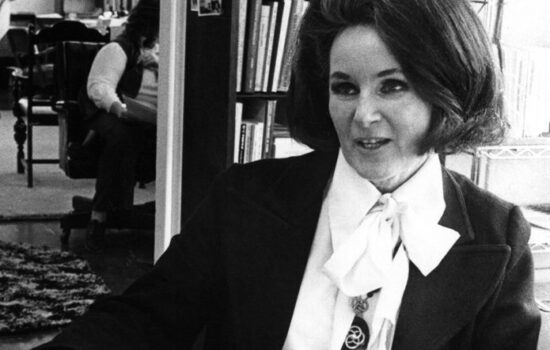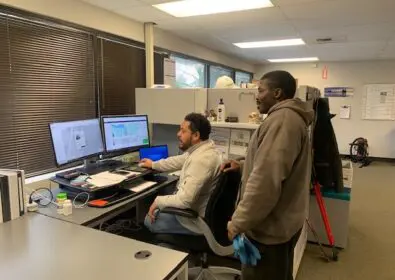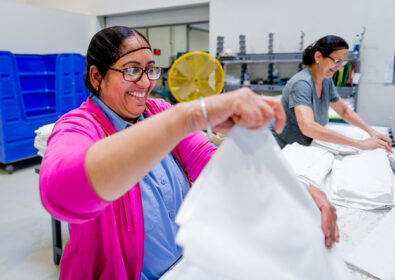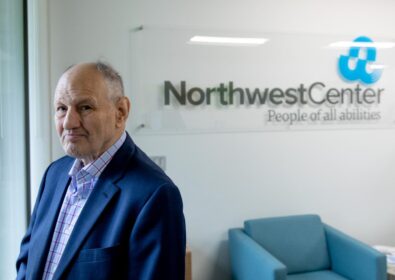Society’s attitude toward her child changed Katie’s life forever; she became an untiring advocate for her son and a change agent for the meaningful inclusion of individuals with disabilities across the nation. She also became one of the forces behind Northwest Center. Katie’s uncompromising vision pushed Northwest Center to continuously improve its programs and gain new ground for individuals with disabilities. Her philosophy influenced Northwest Center’s culture of inclusion and philosophy of designing solutions for the individual, rather than use a cookie-cutter approach of “one plan fits all.”
In the 1950s and early ’60s, Dolan was a model, actress, and later the host of “Women’s World” and “Eye on Seattle” on KIRO-TV. Her theatre training and outgoing personality served her well as an advocate for people with disabilities.
“You would be mesmerized, simply mesmerized by her,” remembers board member Parul Houlahan. “She could also be very polarizing. She could get a room completely divided. You either loved her or hated her.”
“Katie wasn’t always right, but she was never in doubt,” agrees former board president Neal Lessenger. “She did almost everything in the book to make improvements in the lives of the developmentally disabled.”
Making Real Connections
Dolan was part of the group who wrote and lobbied to pass House Bill 90, “Education for All,” the first law in the nation to guarantee education to children of all abilities. To get the law passed, she made the most of her contacts and personality. There are revealing stories in her 2006 Seattle Times obituary:
When the Legislature was in session, Mrs. Dolan would be left with the most difficult people to lobby, one of them a conservative lawmaker who displayed a Bible on his desk. “She said to him, ‘House Bill 90 is God’s Bill!’” [Northwest Center founder Janet] Taggart said. “She talked to him in his language.” Mrs. Dolan relished her reputation as an occasional irritant. One social-services employee hung one of Mrs. Dolan’s letters to the wall by sticking a knife into it, Taggart recalled.
Founder Evelyn Chapman remembers Dolan’s idea of how to connect with legislators who would vote on House Bill 90: “We did a survey to find out who had a family member or a child with a special need, and to count them on our list of people that we should make friends with.”
But the connections Dolan made were real. When Houlahan first moved to Seattle in 1980, the dean at the University of Washington School of Social Work suggested that she and Dolan might have a lot in common. The first time the women talked, “we were on the phone for three and a half hours,” Houlahan laughs. They would stay connected as colleagues, advocates, and family for the rest of Dolan’s life. Houlahan was Dolan’s “daughter by choice,” married one of Dolan’s nephews, and today is the guardian of Dolan’s son Patrick.
Lessenger remembers Dolan’s kindness in helping a friend work through her grief after losing a baby to Sudden Infant Death Syndrome (SIDS), something Dolan had experienced years earlier. “Katie called my friend and talked to her for quite a while. A few weeks later, the friend said, ‘I just want to thank you for introducing me to Katie Dolan. That woman is so wonderful!’”
“Katie was brilliant,” says Chapman. During Northwest Center’s early days, Dolan “would always find the best and beg them to come and give us their wisdom.”
“Persuade them probably is more like it,” Taggart says. “She could persuade anybody to do anything.”
Sherry McNary, daughter of founders Myrtle and Bob McNary, agrees: “She was a force.”
It was Dolan’s idea to launch the Northwest Center Mother’s Guild in the mid-1960s, which organized the women into a formidable group of political lobbyists.
Dolan founded the organization The Troubleshooters with Taggart, where they worked to ensure that children and adults with disabilities received deserved benefits and services, and which inspired legislation that established Protection and Advocacy agencies in every state.
She helped transform sheltered workshops into training grounds where individuals with disabilities could build skills to move to community-based jobs.
A member of the board when Northwest Center established its monumentally successful relationship with Value Village stores, she worked to legally preserve the profit-sharing agreement that helps fund so many of Northwest Center’s programs.
At her death, she was working on yet another program to benefit people with disabilities: MediCard for All, a credit-card sized device that could contain an entire medical history.
Throughout it all, Dolan’s work was never “an exercise in lobbying or political science,” she told author Susan Schwartzberg in the book Becoming Citizens: Family Life and the Politics of Disability (University of Washington Press, 2005). “From our viewpoint, it was a matter of life and death.”
In 2006, a Seattle Times editorial described Dolan as “the former model with the inner Big Bad Mama Bear” who “used that potent arsenal to better the lives of children with disabilities in Seattle, throughout Washington, and beyond.” Northwest Center is proud to have known Katie Dolan. Her remarkable legacy shaped who we are today and is one that we will always strive to honor.



